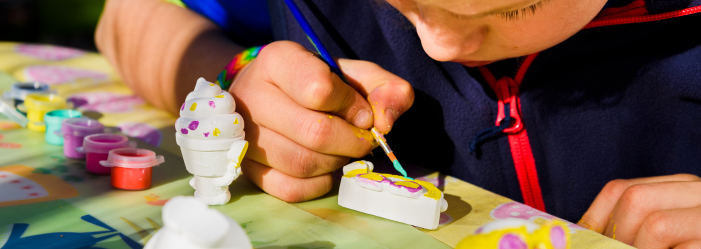5 Strategies to Improve your Child's Focus and Attention Span
Many parents, at one time or another, struggle to get their kids to focus...whether it’s barely sitting at the dinner table for five minutes, waiting in line at the bank, or going grocery shopping.

One of the most common problems many children have is focusing on particular tasks for long periods of time. Having a well-developed concentration span, however, is an important key to success at school. The ability to focus on a particular task, project, or lesson has a direct bearing on the amount of information a child can retain and later apply. The ability to filter out irrelevant distraction and focus on a particular project helps develop self-control in a child as well.
There are strategies teachers use in the classroom, such as seating kids away from distractions, making learning fun, varying teaching methods, setting up routines, etc. These are great strategies to use in the classroom, but what about helping your child to build focus, self-control and attention span at home?
Here are five strategies you can use to work with your child at home to improve focus.
1.
Play board games for concentration.
Board games are one of the best ways to help your child build self-regulation skills.
The Center for the Developing Child defines self-regulation skills as:
“the mental processes that enable us to plan, focus attention, remember instructions, and juggle multiple tasks successfully…the brain needs this skill set to filter distractions, prioritize tasks, set and achieve goals, and control impulses.”
The more you can help your child practice attention skills at home, the sooner they will be able to apply those skills and concentrate in school.
Suggestions of self-control games include:
Suggestions of board games for concentration include:
2. Practice waiting – A LOT – to improve attention span.
The more you can practice waiting with your kids the more they will improve. Great places for practicing self-regulation include the waiting room at the doctor’s office, the grocery store, and the dinner table. At these times, instead of reaching for your phone or electronic device to distract your child, play creative hand games or mind games to improve focus and attention. They only require your body sitting in a chair and nothing else.
Some examples include:
- The Thinking Game - have your child describe something and you have to guess what it is
- I Spy - you describe something that you see and your child has to guess what it is.
- Rock, Paper, Scissors - The rock is a closed fist; paper is a flat hand with fingers and thumb extended and the palm facing downward; and scissors is a fist with the index and middle fingers fully extended toward the opposing player. Rock wins against scissors; paper wins against rock; and scissors wins against paper.
- Finger Baseball - this is a fun game of numbers and baseball rules. With two players, one starts as pitcher and the other as batter. Both players throw either one, two, three or four fingers, representing a base. If both the pitcher and batter throw the same thing, it counts as a hit (to that number of bases), if they throw a different number, it is an out. The batter gets three outs, and play continues for nine innings. Runners must advance with new hits. For example, a runner on second goes to third on a single. Keeping track of runners and outs in your head can be a fun challenge!
- Chopstick Game - This traditional Japanese game just needs two pairs of hands and some strategy (and simple adding) skills! Good fun for getting kids thinking - and every game ends up differently!
In addition, practice waiting at home for a toy that a sibling has, a special treat like a cookie, or a toy they want to buy at the store.
If waiting is met with tears, sadness or a temper tantrum, be sure to acknowledge their feelings and validate how hard this must be for your child, but stress the need to be patient and wait. Building self-control takes a lot of work – especially for kids!
Finally, have your child practice sitting at the dinner table until everyone is finished. Getting them used to sitting for about 30 minutes can help kids stay focused once they transition into the classroom.
3. Let them experience physical challenges to develop vestibular and proprioceptive senses.
In order for kids to listen, focus, and learn to sit still for a period of time, they must develop both proprioception and vestibular sense by experiencing many physical challenges during childhood. The most critical time to develop a child’s proprioception and vestibular sense is before age six.
Proprioception is what tells you where your body parts are without having to look at them. Some activities to support your child’s proprioceptive input include: Pushing or pulling a wagon, building a fort, raking leaves, shoveling snow, digging in the dirt, carrying buckets of sand or water, giving hugs, kneading playdough, jumping on a trampoline, squeezing a stress ball, or playing Tug-O-War with a stretchy band.
Vestibular sense provides information about where the body is in relation to its surroundings. Some activities that support your child’s vestibular sense include: Spinning in circles, rolling down a hill, spinning on a swing, going upside down, climbing trees, rocking, jumping rope, somersaults or cartwheels, using monkey bars, skating, going backwards, swimming, or dancing.
In other words, let them get outside and be active!
4. Reduce screen time.
Research shows that kids who have more screen-time (or video games) have lower attention spans and lose focus. Michael Manos, director of the ADHD Center for Evaluation and Treatment at the Cleveland Clinic, found that children aged 5 or younger who experience two or more hours of daily screen time are nearly eight times more likely to be diagnosed with focus-related conditions including attention deficit hyperactivity disorder (ADHD). He states, “Electronics allow for repeated stimulation and immediate gratification every few seconds. And when we become accustomed to such rapid and frequent stimulation, it can be hard to focus when things in the real world aren’t as mesmerizing.”
So try to cut screen time and perhaps even try a “screen fast” where electronics are completely removed for a longer period of time.
This can result in deeper sleep, a brighter and more even mood, better focus and organization, and a greater time doing physical activity. You just might find that, without screens, your child begins to enjoy the things they used to, is more drawn to nature, and imaginary or creative play returns.
5. Reading to children.
Reading to children is a fun and simple way to build their concentration span on a daily basis. When you read to your child it encourages real attention and listening. The more interested children are in the story, the more they will hang onto every word and pay attention. Stories are also a great way for children to learn vocabulary and develop phonological awareness (through rhyming and repetition). Storytime may just become a favourite part of their (and your) day!
Try these strategies at home to help get your kids to sit at the dinner table longer, wait in line at the post office without a fuss, and experience a seamless grocery store trip. You will also be partnering with your child’s teacher as you both work to build focus, concentration and attention span in your child.


ACADEMICS
All Rights Reserved | Faith West Academy | Privacy Policy
Powered by Digital Consultants

